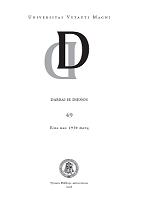KOMUNISTINIS ĮSPAUDAS VIDURIO RYTŲ EUROPOS VALSTYBIŲ PILIETINĖJE VISUOMENĖJE
THE COMMUNIST IMPRINT ON THE CIVIL SOCIETY OF CENTRAL AND EASTERN EUROPEAN STATES
Author(s): Saulius SpurgaSubject(s): Cultural history
Published by: Vytauto Didžiojo Universitetas
Keywords: vienpartinė sistema; autoritarinė santvarka; ekonominis šokas; single party system; authoritarian regime; economic shock.
Summary/Abstract: One of the main features of the single-party Communist system was its suppression of any kind of independent political activity whatsoever. No wonder that the situation in Communist Central and Eastern Europe (CEE) gave rise to discussions about the significance of civil society and its influence on democracy. During the period of Communist rule, civil society manifested itself in the way dissidents opposed to the regime emerged and organized themselves; at the turn of the 1990s, it consisted of active movements that succeeded in ridding themselves of the regime; and in the post-Communist period civil society became the way society structured itself in a democratic state. As the CEE states were freeing themselves from Communist oppression, civil society played an important role; but at the present time the weakness of civil society is one of the features that distinguishes the CEE states not only from Western Europe but also from other countries that had recently started on the road towards democracy after having shed their authoritarian regimes. This distinguishing feature is due to the CEE states’ Communist past. The relative unwillingness of CEE citizens to join organizations may be explained by the social and economic shocks attendant upon the deep political transformations that occurred, as a result of all of which the social status of several different groups of people changed rapidly; relations between them broke off; and mutual trust diminished. An additional factor lies in the circumstance that because of low wages people are forced to work in several jobs, which leaves them with much less free time to engage in civic activities. There is some evidence from research that in CEE states after their entrance into the EU civic activities do tend to diminish.
Journal: Darbai ir dienos
- Issue Year: 2008
- Issue No: 49
- Page Range: 235-249
- Page Count: 15
- Language: Lithuanian

